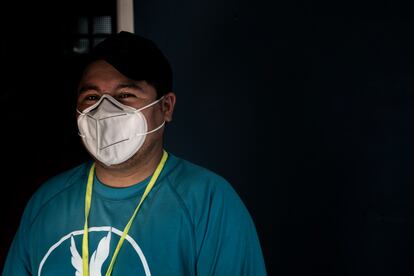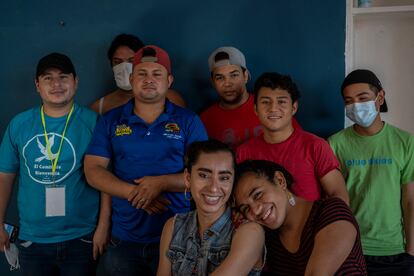The Guatemalan asylum seeker who created a refuge for gay and transgender migrants on the US border
Estuardo Cifuentes fled persecution at home because of his sexuality and found himself trapped by Donald Trump’s policies in Matamoros, where he set up Rainbow Bridge to help LGBT asylum seekers

Kissing his partner goodbye on a normal day before heading to work changed the life of 32-year-old Estuardo Cifuentes forever. It was mid-2019 when he stepped out of his front door in Guatemala City and said goodbye to his boyfriend before getting into a waiting Uber. A police patrol that witnessed the scene approached to carry a supposed routine check, and one of the officers started to hit Cifuentes while shouting insults about his sexual orientation. Cifuentes complained about the incident but all he achieved was to invite further harassment. According to Cifuentes, his identification was taken from him at the police station and he was placed under 24-hour surveillance. In fear for his safety, he decided the best thing he could do was leave the country and seek asylum elsewhere, even if this meant leaving behind his comfortable life in the Guatemalan capital.
“Despite the fact that the LGBT community is discriminated against in Guatemala, I had managed to live with it. I had been with my boyfriend for eight years and we had a marketing and publicity firm that we had been running together for seven years. At times we were blackmailed by the gangs and we had to make some adjustments. But we had managed to make a life for ourselves in spite of all the bad conditions in Guatemala. We had adapted,” he says. Like the hundreds of thousands of Guatemalans who try to make their way to the United States every year, Cifuentes sought the aid of a coyote, the name given to people who take money to smuggle migrants across borders. Cifuentes embarked on a 17-day odyssey, sometimes walking 12 hours a day, sharing a trailer with dozens of other migrants and eventually being kidnapped and held for 21 days in Reynosa, in the north of Mexico.
We haven’t done anything wrong, but because of who we are people treat us badly. For being who we are people prefer not to see usValery, Honduran transgender woman
When he was able to gather together the money to pay for his release his kidnappers handed him back to the coyotes, who helped him to cross the Rio Grande where he turned himself in to the US Border Patrol for protection. But his nightmare journey was far from over. It was July 2019 and the Donald Trump administration had just implemented its Migrant Protection Protocols (MPP), legislation that gave the US authorities the power to return asylum seekers to Mexico while their immigration applications were being processed. After seven days of detention, Cifuentes was sent back over the border to Matamoros.
While he was waiting for his turn to state his case to the US authorities, Cifuentes worked as a taxi driver, a waiter and a cleaner until, in March 2020, the Trump administration closed the border and placed an indefinite halt on all asylum hearings. “Being in that situation made me realize that I was a privileged person and there were others who needed more help than me, so I used a little of what I have to help out,” he says. Together with Resource Center Matamoros, an NGO that had helped him to find somewhere to stay and provided legal aid on his arrival in Mexico, Cifuentes set up Rainbow Bridge, an organization to help migrants from the LGBT community.
Double discrimination against LGBT migrants

During the months he spent in Matamoros, Cifuentes noticed that gay and transsexual people in the MPP system were subjected to double discrimination, as migrants and because of their sexual orientation, which made them more vulnerable to violent attacks. The situation was particularly tough for those who were living in the refugee camp on the banks of the Rio Grande, which housed over 2,000 people before the coronavirus pandemic and where several instances of threats and violence toward transgender women were recorded.
Rainbow Bridge started offering legal and medical assistance to migrants. The organization also helped a transgender asylum seeker at the camp who had been forced into prostitution by the cartels. Terrified and with the re-opening of the border with the US still on hold, she asked Rainbow Bridge to help her return to El Salvador. After learning of her experience, Cifuentes’ organization decided to create a refuge of its own for LGBT migrants to stay until they were able to find work and a place to rent in town, while awaiting a verdict on their asylum applications from the US authorities. “We came up with a comprehensive plan in which we took care of health, housing, food, security, mental health and leisure time to keep people engaged to a certain point, and to try and make the process easier,” Cifuentes says.
The refuge has a capacity of nine migrants. During an EL PAÍS visit at the end of February there were three transgender women, two Honduran women and a Cuban woman, all of whom had been persecuted in their home countries because of their self-identification, and five homosexual men from Cuba, Nicaragua and Venezuela. For all of them, the refuge was a kind of life vest against the discrimination and insecurity they had been subjected to when they were living in the camp and at other places along the border.
“We haven’t done anything wrong, but because of who we are people treat us badly. For being who we are people prefer not to see us,” says Valery, a Honduran transgender woman who arrived in Matamoros in March 2020. “Estuardo has treated me very well. He got me out of the camp when I had given up hope, when I told him I couldn’t take being there any more, that I didn’t know what to do. He brought me here and he has always looked out for us.”
“He has been like a guardian angel for all of us,” Noel, a migrant from Nicaragua who says he has been left traumatized by being kidnapped in Matamoros, concurs. “He has been someone to lean on throughout this situation. With what you earn out there, there isn’t enough to rent an apartment or to buy food.”
Over the past few weeks, some of the migrants who were staying at the refuge have managed to cross the border thanks to the program implemented by the Joe Biden administration, allowing asylum seekers sent back to Mexico under the MPP to enter the United States. Cifuentes himself has benefitted from the shift in policy: on March 3 he crossed into Texas. Although his original plan was to head to Las Vegas with a relative while he prepared his asylum case, he has decided to remain in the frontier town of McAllen to continue his work with the running of the refuge in Matamoros, helping others migrants to reach the US.
“We want to carry on assessing cases with the legal assistance group and monitoring their progress as they wait to be presented in the courts, seeing that the necessary documents are provided and continuing to help people with the legal advice they need,” he says. While he admits that starting from zero again is not proving easy, Cifuentes wants to continue using his voice to draw attention to the reality that migrants live through, those who as he did exist in a state of limbo on the border for years. “I want people to know what has happened here because the previous administration blocked the asylum process,” he says. “The former president, Trump, didn’t want to do it, but I want to show people the damage he caused with his policies.”
English version by Rob Train.
Tu suscripción se está usando en otro dispositivo
¿Quieres añadir otro usuario a tu suscripción?
Si continúas leyendo en este dispositivo, no se podrá leer en el otro.
FlechaTu suscripción se está usando en otro dispositivo y solo puedes acceder a EL PAÍS desde un dispositivo a la vez.
Si quieres compartir tu cuenta, cambia tu suscripción a la modalidad Premium, así podrás añadir otro usuario. Cada uno accederá con su propia cuenta de email, lo que os permitirá personalizar vuestra experiencia en EL PAÍS.
¿Tienes una suscripción de empresa? Accede aquí para contratar más cuentas.
En el caso de no saber quién está usando tu cuenta, te recomendamos cambiar tu contraseña aquí.
Si decides continuar compartiendo tu cuenta, este mensaje se mostrará en tu dispositivo y en el de la otra persona que está usando tu cuenta de forma indefinida, afectando a tu experiencia de lectura. Puedes consultar aquí los términos y condiciones de la suscripción digital.









































